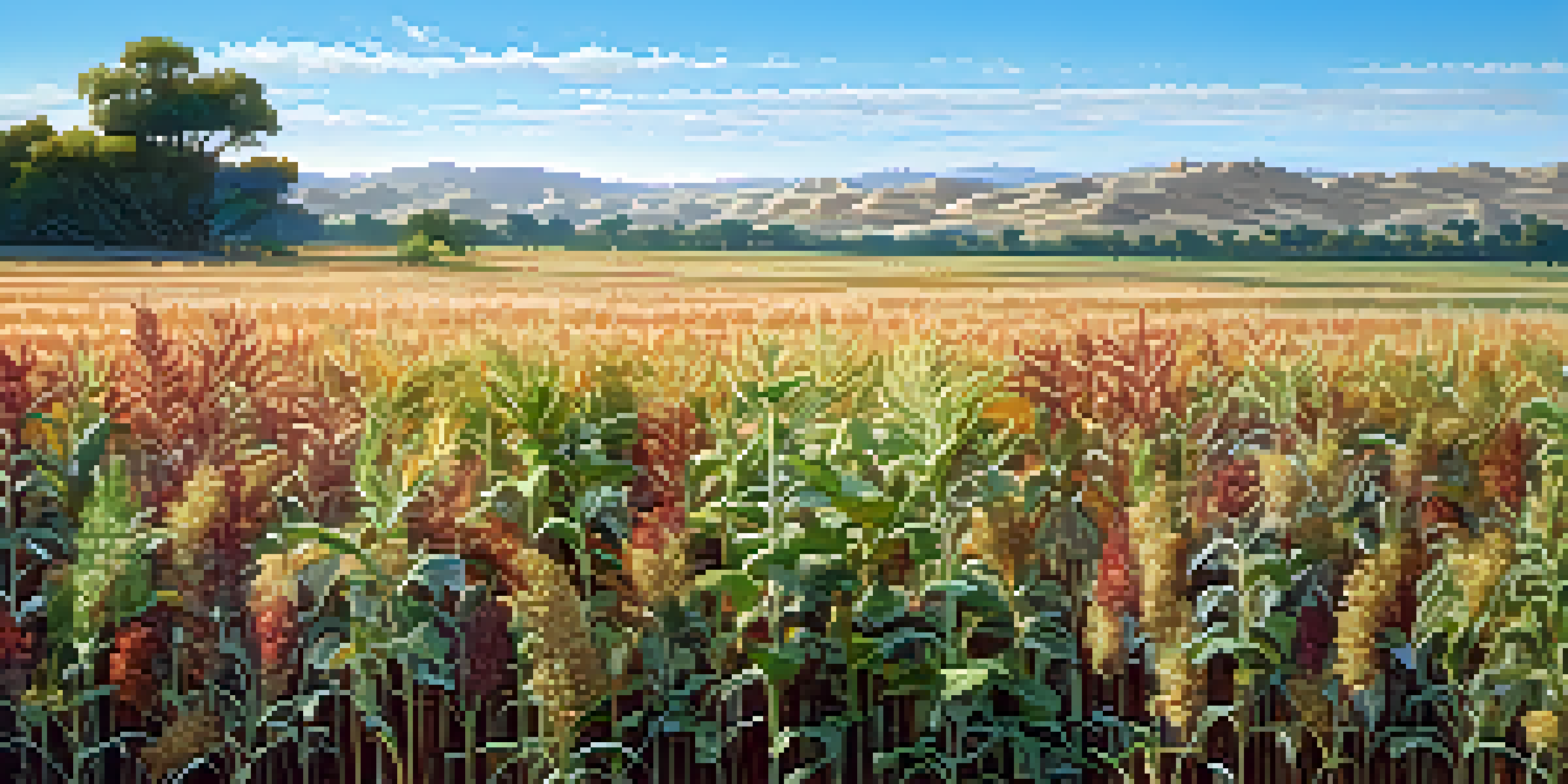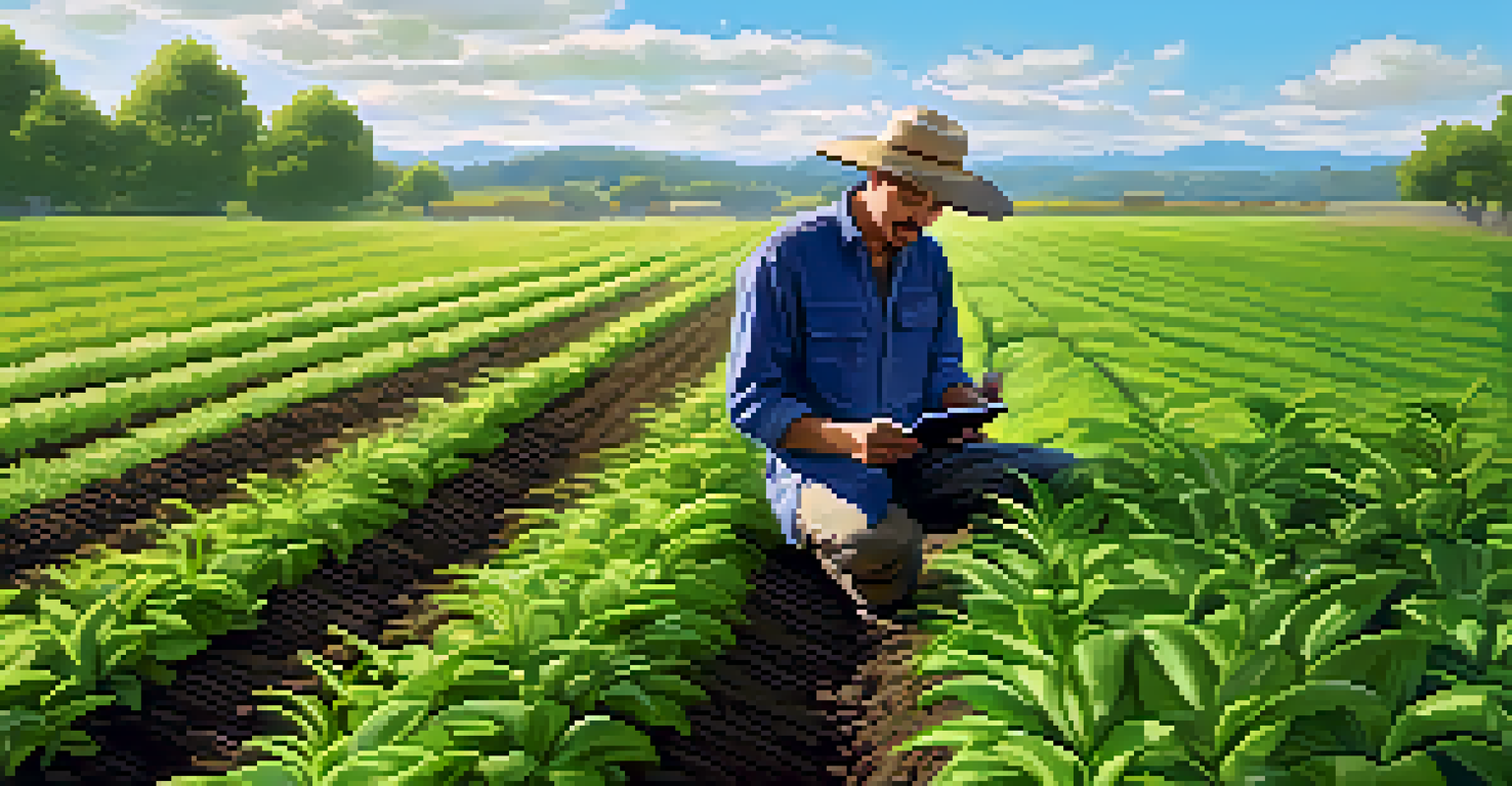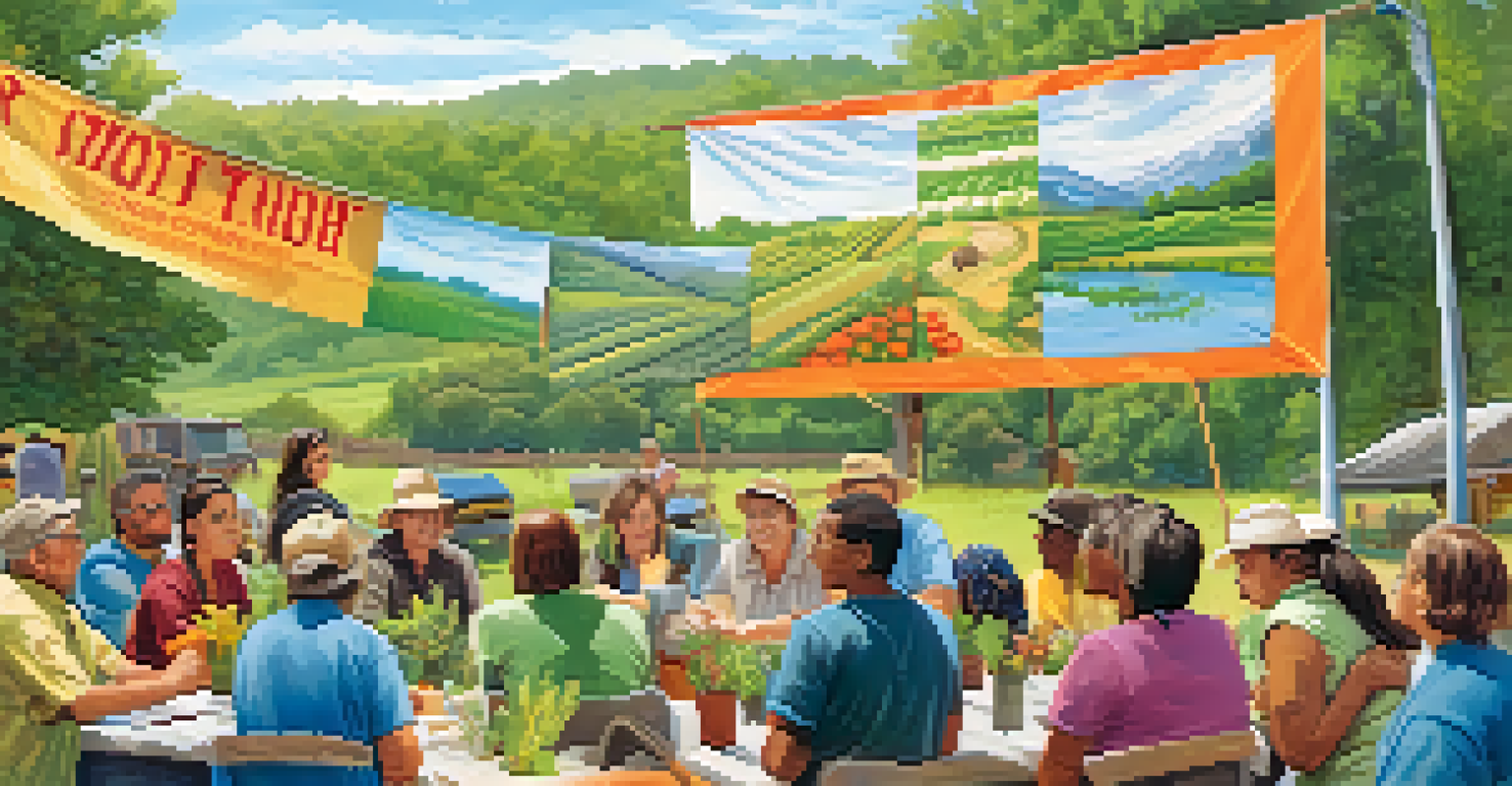Plant Selection for Sustainable Agricultural Water Use

Understanding Sustainable Agriculture and Water Usage
Sustainable agriculture focuses on meeting current food needs without compromising future generations' ability to do the same. One key aspect is efficient water use, as water scarcity becomes an increasingly pressing issue in many regions. By understanding how sustainable practices can lower water consumption, farmers can contribute to a healthier ecosystem and a more resilient food system.
The greatest threat to our planet is the belief that someone else will save it.
To achieve this, selecting the right plants is crucial. Some plants require less water and can thrive in arid conditions, making them ideal choices for sustainable farming. For example, drought-resistant crops like sorghum and millet can be excellent alternatives to traditional water-intensive grains.
Moreover, integrating native plants into your agricultural practices can enhance biodiversity while minimizing water use. These plants are adapted to local climates and soil conditions, requiring less irrigation and maintenance. In this way, sustainable agriculture not only preserves water resources but also fosters a thriving ecosystem.
The Role of Climate in Plant Selection
Climate is a critical factor when selecting plants for sustainable agriculture. Different regions have unique climatic conditions that dictate which plants will flourish and which will struggle. Understanding local climate patterns, such as rainfall and temperature fluctuations, helps in choosing plants that require minimal water.

For instance, in arid regions, selecting heat-tolerant varieties like chickpeas or lentils can significantly reduce water usage. These plants not only adapt well to dry conditions but also contribute to soil health through nitrogen fixation. This symbiotic relationship with the soil can create a more sustainable farming system that requires fewer chemical fertilizers.
Sustainable Practices Save Water
Implementing sustainable farming practices, such as selecting drought-resistant crops, helps conserve water and supports a healthier ecosystem.
Additionally, farmers can leverage climate-resilient practices by planting crops that align with seasonal weather patterns. By monitoring climate data and adjusting planting schedules, growers can optimize water use and minimize waste, ultimately leading to more sustainable agricultural practices.
Benefits of Native Plants in Agriculture
Native plants are often overlooked in agricultural practices, yet they hold immense potential for sustainable water use. These plants are naturally adapted to the local environment, requiring less water and fewer resources to thrive. By incorporating native species, farmers can create a more resilient agricultural system that is less reliant on irrigation.
We won’t have a society if we destroy the environment.
For example, using native grasses and legumes in pasture systems can improve soil health and reduce water runoff. This not only conserves water but also enhances the overall productivity of the land. Moreover, native plants support local wildlife and pollinators, contributing to ecological balance.
Integrating native plants into crop rotations or as cover crops can further enhance soil moisture retention and reduce erosion. This practice not only benefits water conservation but also promotes biodiversity, making it a win-win for both farmers and the environment.
Choosing Drought-Resistant Crops for Sustainability
Drought-resistant crops are essential for sustainable agriculture, especially in regions prone to water shortages. These crops are specifically bred or selected to withstand dry conditions, ensuring a viable harvest even during periods of low rainfall. By choosing drought-resistant varieties, farmers can significantly reduce their dependence on irrigation.
For instance, crops like quinoa and amaranth are not only drought-tolerant but also packed with nutrients, making them excellent choices for sustainable diets. Adopting these alternatives can help farmers diversify their production while conserving water resources.
Native Plants Enhance Resilience
Incorporating native plants into agriculture not only reduces water use but also promotes biodiversity and supports local wildlife.
Additionally, implementing crop rotation strategies with drought-resistant varieties can enhance soil health and reduce pest pressures. This holistic approach not only promotes sustainable water use but also leads to more resilient farming practices, ready to face the challenges of climate change.
The Importance of Soil Health in Water Conservation
Soil health plays a crucial role in water conservation, as healthy soils retain moisture better and are more productive. Practices that focus on improving soil health, such as composting and cover cropping, can make a significant difference in sustainable agriculture. Healthy soil not only supports plant growth but also enhances water infiltration and retention.
For example, implementing cover crops during the off-season can prevent soil erosion and improve organic matter content. This leads to better moisture retention, ultimately reducing the need for irrigation during the growing season. Farmers can see a marked improvement in crop performance and water efficiency by focusing on soil health.
Moreover, healthy soils support a diverse ecosystem of microorganisms that aid in nutrient cycling and plant health. By fostering this microbial community, farmers can create a more resilient agricultural system that minimizes water use while maximizing yield.
Utilizing Technology for Efficient Water Management
In today's digital age, technology plays a pivotal role in promoting sustainable agricultural practices, particularly in water management. Tools like soil moisture sensors and weather forecasting apps can help farmers make informed decisions about irrigation. By using data-driven insights, growers can optimize their water usage and reduce waste.
For instance, precision irrigation systems allow farmers to deliver water directly to the roots of plants, minimizing evaporation and runoff. This targeted approach not only conserves water but also ensures that crops receive the right amount of moisture for optimal growth.
Technology Aids Water Management
Utilizing technology like soil moisture sensors allows farmers to optimize water usage, leading to more efficient and sustainable agricultural practices.
Additionally, integrating technology with traditional farming practices can lead to innovative solutions for water conservation. By combining knowledge of local conditions with advanced tools, farmers can create sustainable practices that adapt to their unique challenges and promote efficient water use.
Community Involvement in Sustainable Practices
Community involvement is essential for advancing sustainable agricultural practices, particularly in water use. Engaging local farmers, agricultural organizations, and consumers can create a collective effort towards more sustainable water management. Sharing knowledge and resources can empower everyone to make informed choices that benefit the entire community.
For example, local workshops and educational programs can help farmers understand the importance of plant selection and water conservation techniques. By fostering collaboration, communities can develop best practices tailored to their specific environmental conditions, leading to more effective water use.

Moreover, community-supported agriculture (CSA) initiatives can encourage consumers to support local growers who prioritize sustainable practices. This relationship not only boosts local economies but also fosters a shared commitment to preserving water resources for future generations.